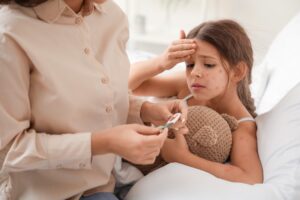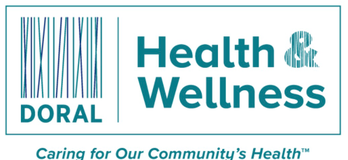Chickenpox

Are you suffering from rashes and blister sores on your body? If yes, these are the signs of chickenpox. Talk to a specialist for infectious diseases if you have any concerns.
It is a viral infection that happens from the varicella-zoster virus (VZV). It can happen to anyone (from adults to children). While you can prevent this infection with vaccines, once you are infected it heals on its own- treatment only helps to manage the symptoms. As Chickenpox is contagious it can spread easily through direct contact with an infected person.
While it cures on its own, you need to know how you can manage its symptoms and how you can prevent it from spreading. Noticing the symptoms and taking treatment can help you prevent them by consulting a doctor of Infectious diseases.
Keep reading this article to learn in detail about chicken pox.
Chickenpox is a viral infection that is caused by the varicella-zoster virus. It is quite common in the US, as 4,000,000 people (about twice the population of New Mexico) get infected every year. While this disease heals on its own, it gives symptoms like high fever, red rashes, and blisters, and if it’s severe it gives you shingles. Most children get this infection, but it can happen to anyone.
Treatment can manage some of the symptoms but not all. You have to wait until it heals itself. But in some cases, severe infection can lead to death too. So, you must prevent this disease by taking its vaccines or avoiding contact with infected persons.
Causes
Chickenpox is caused by the varicella-zoster virus. This virus can spread through direct contact with the rash or by inhaling the germs when the infected person coughs or sneezes.
Transmission routes
This viral infection can spread by these transmission routes:
- Direct contact with an infected person.
- Inhaling air from an infected person through coughs and sneezes.
- Coming in contact with the rash
- Encountering the fluids released by the mouth, eyes, or nose of the infected person.
Symptoms
Chicken pox symptoms show up after your contact with the infection. The most common symptom is a rash which is an itchy, fluid-filled blister that can turn into scabs. The rash first appears on your back, chest, or face and spreads throughout the body. In one week or so, blisters started to turn into scabs.
Other symptoms that begin in a day or two are
- High Fever
- Itchy and sore skin
- Fatigue
- Headaches
- Loss of appetite or stomachache
- Spots.
- The skin is starting to look blotchy.
Diagnosis and Treatment
It is extremely easy to diagnose as doctors can tell about it just by looking at the rash and the symptoms. For treatment, rest and fluid intake are particularly important. While chickenpox goes away in a week or two, treatment is basically by home remedies or over-the-counter medications.
- Put ice cubes or an ice pack or a moist rag over the rash.
- Keep the person’s body temperature on the cooler side.
- Make sure that the patient does not scratch the rash. In the case of kids, you need to trim down their nails.
- You can use a lotion with antihistamines on the rash. Ask the pharmacist to help you.
- Medications like Benadryl and cetirizine are the two over-the-counter medicines that are given to the patient to counter the itch.
- The patient needs to take a cold bath every day. In the case of children, give them an oatmeal bath. When you’re about to dry them don’t use the towel, instead, pat them dry.
Don’t give aspirin to a child who is suffering from a fever. You can give them pain relievers such as acetaminophen. If you don’t know which medicine to give, ask a doctor or pharmacist.
In case of severe symptoms, the patient needs to get hospitalized.
Chickenpox is contagious and so, you must make sure that your children get the chicken pox vaccine. If your child gets infected, use home remedies to treat the symptoms until chicken pox heals itself.
Want to know what treatment is used in case of severe symptoms? At Doral Health and Wellness, we have specialists for Infectious Diseases that can help you manage your condition. For more information, you can visit us at 1797 Pitkin Avenue, Brooklyn, New York, 11212, or call us at 1-347-384-5690. You can also visit our website at https://doralhw.org or contact us at info@doralhw.org if you have any queries.


